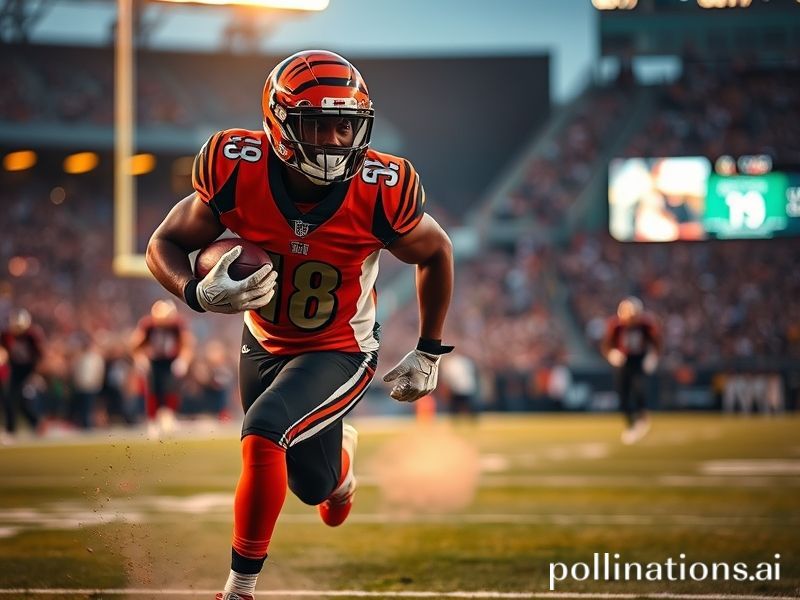Joe Mixon’s $27M Second Chance: How the World Learned to Stop Worrying and Launder Reputations
Joe Mixon and the Universal Art of Getting Away With It
By Our Correspondent in the Cheap Seats of Human Morality
From the air-conditioned press boxes of Dallas to the sweat-soaked living rooms of Lagos, the Joe Mixon story is less about a 5-foot-10 running back than about the planet’s favorite blood sport: watching someone else dodge accountability in real time. Mixon’s latest contractual resurrection—inked for up to $27 million with the Houston Texans this spring—arrives like clockwork every time an NFL franchise decides domestic violence footage has a statute of limitations measured in 40-yard-dash speed. The rest of us, scattered across time zones and tax brackets, merely place our bets on how many news cycles it takes for outrage to be outrun by fantasy points.
For the uninitiated (bless the glaciers you’ve been hiding under), Mixon was captured on camera in 2014 punching a female student so hard at an Oklahoma sandwich shop that her head bounced off a table like a defective bobblehead. Charges were filed, then deferred; he sat out a season, then ran for 2,027 yards and 17 touchdowns. The tape? Released only after a judge tired of local boosterism, by which point Mixon had already been reincarnated as a second-round draft pick. America pioneered the genre, but the script has gone global: sign, spin, sprint.
Consider the export value. In São Paulo, Corinthians just welcomed back midfielder Marquinhos Calazans after a domestic assault suspension so brief it felt like a coffee break. Across the East China Sea, Chinese Super League clubs routinely recycle foreign stars with rap sheets longer than the Great Wall, provided the goals-per-game ratio is imperial enough. Meanwhile, the Saudi Pro League—sportswashing’s hottest pop-up boutique—has become the Ellis Island of reputational laundering: throw in a few petrodollars and presto, redemption comes with zero-calorie remorse.
The Mixon Model, then, is franchisable intellectual property, a McDonald’s of moral elasticity. All that changes are the accents and the exchange rates. FIFA, ever the moral barometer, has already issued a lukewarm “concern,” which in bureaucratic Esperanto translates to “carry on, but maybe hire a better PR firm.” The United Nations, busy counting war crimes elsewhere, has stayed uncharacteristically quiet, perhaps recognizing that a multibillion-dollar entertainment complex moves faster than international law on its best day.
Yet the true dark comedy lies in the audience participation. In Delhi, office drones argue over Mixon’s ADP (average draft position) in between Zoom calls about quarterly targets. In Berlin, hipsters who boycotted FIFA over Qatar’s labor abuses still queue for Texans jerseys stitched in the same Bangladeshi workshops. Stockholm’s feminist government decries violence against women, but the Swedish fantasy league quietly bumped Mixon up two rounds because “the o-line is healthier this year.” Hypocrisy, like streaming content, is now borderless and on demand.
What does it say about our species that we can synchronize outrage and apathy with the precision of atomic clocks? Perhaps that we’ve evolved into the perfect consumers of moral ambiguity—capable of digesting a highlight-reel stiff arm and a courthouse mugshot in the same gulp, burping up hashtags before kickoff. The planet warms, glaciers retreat, democracies wobble, but the fundamental algorithm remains: if you can average 4.5 yards per carry, someone, somewhere, will build a narrative in which you’re the victim of timing.
And so Joe Mixon jogs into NRG Stadium this autumn, soundtracked by 70,000 Texans chanting his name in the key of selective amnesia. Up in the global nosebleeds, the rest of us check our rosters, mute our consciences, and pretend the game is only being played on grass. The final scoreboard doesn’t tally touchdowns; it tallies how much ugliness we’re collectively willing to amortize into entertainment. On current form, the over/under is infinite.







